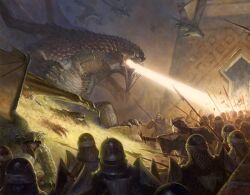Khanfall
| Khanfall | |||||
|---|---|---|---|---|---|
| Information | |||||
| Era | The Thaw | ||||
| Date | c. 3282 AR | ||||
| Location | Tarkir | ||||
| Sets | Fate Reforged | ||||
| Characters | Alesha, Atarka, Daghatar, Dromoka, Kolaghan, Nicol Bolas, Ojutai, Reyhan, Sarkhan, Shu Yun, Silumgar, Tasigur, Ugin, Yasova Dragonclaw | ||||
| Result |
Fall of the khans and clans of Tarkir Rise of the dragonlords | ||||
| Timeline | |||||
| |||||
The Khanfall was an event on Tarkir that occurred around 3282 AR, several years after Sarkhan Vol had traveled back in time to save Ugin from being killed by his twin brother Nicol Bolas.[1][2][3]
Description
After sealing the wounded Ugin in a hedron crucible, Sarkhan Vol returned to his present. Ugin's dragonstorms continued to blaze across the skies of Tarkir, eventually casting the plane's clans into a difficult choice - to abandon their old ways, or die fighting.
Daghatar of the Abzan Houses was the first to submit to his new dragonlord, Dromoka.[4] He smashed the mace holding the spirits of his ancestors as a sign of submission. The former clan proceeded to root out almost all the ancestor trees as well, finally gaining the favor of Dromoka, allowing them to form a bond of unity.
Shu Yun of the Jeskai Way was next to submit during a meeting with the various khans.[1] Dragonlord Ojutai required that every dragon slayer, including Shu Yun, was to be killed as a price, and Shu Yun accepted, allowing the dragonlord to kill him.
Yasova Dragonclaw of the Temur Frontier realized Atarka cared only for hunting.[1] Thus, if she were to offer up a worthy sacrifice of wild animals as food for the dragonlord, she might appease Atarka. It worked, and as long as Atarka was provided a steady supply of hunted food, she would be allowed to share her strength with the people of her mountains.
Alesha of the Mardu Horde also came to a realization - her dragonlord Kolaghan wanted only to soar through the skies at great speed.[1] She needed only follow her, and she bid her clan do the same. Together, they rode out across the plains in the trail of Kolaghan.
Tasigur of the Sultai Brood was the only khan who refused to submit to the dragons, and for this reason, he ended up becoming a decorative corpse for Silumgar's necklace.[1]
References
- ↑ a b c d e Kelly Digges (February 18, 2015). "Khanfall". magicthegathering.com. Wizards of the Coast.
- ↑ Magic Creative Team (March 11, 2015). "Planeswalker's Guide to Dragons of Tarkir, Part 1". magicthegathering.com. Wizards of the Coast.
- ↑ Lauren Bond & DK Billins (February 21, 2025). "Planeswalker's Guide to Tarkir: Dragonstorm, Part 1". magicthegathering.com. Wizards of the Coast.
- ↑ Nik Davidson (February 11, 2015). "No End and No Beginning". magicthegathering.com. Wizards of the Coast.
